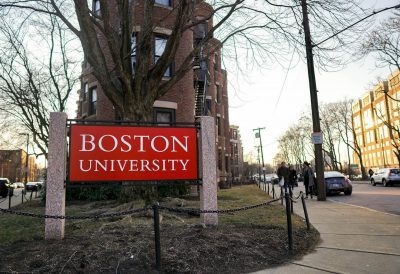
Amid the coronavirus outbreak, Boston University has closed their campus for the remainder of the Spring 2020 semester and made efforts to keep it relatively empty during the summer as well. With the goal of opening campus back up in the fall, the university announced the creation of their COVID-19 Recovery Plan on Friday.
Jean Morrison, university provost and chief academic officer, said the plan is designed to utilize the best case scenario. She said after making the decision to use remote learning for summer sessions, she and other recovery plan contributors began detailing how they’d achieve their goal of bringing students back to campus next semester.
“Once the decision was made about Summer one and Summer two, we’ve had the time to begin the really fairly detailed planning that’s going to be necessary to successfully bring students and faculty and staff back to campus or opening in the fall,” Morrison said. “And we have kept as our highest priority in thinking about coming back in the fall, how do we do so and protect the safety of everyone in our community.”
Morrison said the recent publication of many news articles discussing that BU may not let students return to campus until January 2021 misconstrues the larger efforts of the recovery plan.
“Our planning and our focus right now is on coming back for the fall of 2020. Have we done alternative scenario planning? Of course,” Morrison said. “It would be irresponsible not to think about other possible scenarios, but that focus is inaccurate, and I think students should feel confident. We are planning and we will work hard to come back with whatever constraints we will have at that time in the fall of 2020.”
As part of the plan’s function to expedite and simplify decision making, the plan is composed of five different working groups: undergraduate programs, graduate programs, residential life, research activities and remote learning. Each working group is led by a faculty member relevant to the group’s focus.
Colin Riley, a BU spokesperson, said that in addition to the recovery plan’s working groups, there is necessary guidance coming from health officials.
“Guiding all of this is the public health guidance and our liaison Judy Platt, who’s the director of Student Health Services,” Riley said. “What [the working groups] will be able to do is get information and work in a coordinated fashion, along with the guidance provided by them from the public health perspective.”
Morrison also said that the larger public health situation and guidance from health officials will be critical in helping BU determine their course of action. However, it is because of the uncertainty surrounding public health that the university cannot predict when announcements regarding the Fall semester will be made.
“We have to follow guidance from the state around when it will be safe. So we don’t know [when we can make an announcement],” Morrison said. “But we’re in touch with a lot of public health experts who are helping to make sure that we have the most up to date modeling and information. As soon as we’re in a position to come out with dates around our plan, we are eager to do so.”
While Morrison said it is too early to discuss any definitive measures the working groups have decided to take regarding in-person learning for the fall, she said they are determining the best ways to continue to implement social distancing.
One measure that Morrison said is being considered is how to utilize remote learning even while students are on campus. Specifically, she said it could be used to limit the gathering of large lectures.
“For example, for large lecture classes, we are exploring which of those we might do remote learning for the lecture portion, and students could stay in their dorms to do that portion,” Morrison said, “but then we would gather in person for discussion sections.”
Riley said until a decision is made, students should refer to the announcements the university continues to make and to read the news critically.
“Good, practical advice is for anyone when reading is not to jump to conclusions,” Riley said. “Listen to the clear communications that we’ve tried to make.”
He also said that despite how pleased administrators are with the transition to remote learning, they recognize that it isn’t ideal and are prioritizing bringing back in-person learning as soon as they possibly can.
“Again, we’re really pleased with how well students have done, and our faculty has been really extraordinary, but [remote learning] isn’t ideal. So our goal is to be back in person for the fall,” Riley said. “The president said it in plain language: you hope for the best and you prepare for the worst.”





























































































































